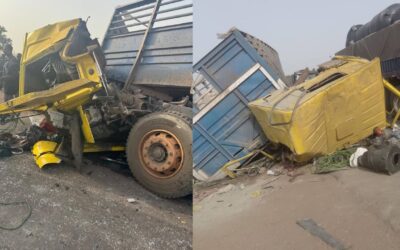Medical Brain Drain: No End in Sight Yet

Nigeria’s healthcare system has over the years suffered from inadequate funding, neglected clinics and hospitals, and poorly paid and overworked healthcare workers who frequently move abroad for better employment.
Nigeria’s medical brain drain issue has become an albatross. Resident doctors, under the aegis of the National Association of Resident Doctors (NARD), with over 16,000 members, had on August 2, 2021, started a nationwide industrial action to demand implementation of agreements reached with the Federal Government on payment of owed salaries and arrears, hazard allowance, residency programme, payment of life insurance benefits to families of members that died of COVID-19,among others.
It is depressing to note that the current month-long strike action by members of the NARD is the fourth within the past two years over the same issues.
The knotty issue for the strike actions is government’s constant failure to honour the agreement voluntarily reached with NARD over its demands.Instead, government dragged the doctors to the National Industrial Court in Abuja, where Justice John Targema ordered the two parties – the Federal Government and the NARD – “to suspend all forms of hostilities.”
But the President of the Nigerian Medical Association (NMA), Prof. Innocent Ujah, after the association’s National Executive Council meeting in Benin City, Edo State, told journalists that if the Federal Government fails to implement the agreements after the expiration of its 21-day notice, NMA will be forced to declare a nationwide strike and join the resident doctors.
According to the National Association of Resident Doctors (NARD), about N576 billion ($1.2 billion) is lost to medical tourism yearly in Nigeria, an amount that could have been invested in the development of the country’s health care system and the country as a whole. This is about N100 billion less than the N632.7 billion allocated to the health sector in the 2021 budget.
The lingering strike by resident doctors has caused many of them to leave the country for greener pastures abroad.
This is evident in the recent recruitment that was conducted for Nigerian doctors by the Saudi Arabian Ministry of Health in Lagos and Abuja.
Nigeria has one of the worst health indices globally and the reason for that is simple. The World Health Organisation (WHO) recommends one doctor to 600 patients, but what we have in Nigeria is about one doctor to 10,000 patients and it is even worse in the remote parts of the country where it is one doctor to over 22,000 patients.
The Nigerian government has not shown enough interest in the health sector and this is evidenced in issues like the failed National Health Insurance Scheme(NHIS). Recently, during the public hearing on NHIS, it was pointed out that in the Nigeria constitution, there is no single word that has a semblance of health; the best is that the government shall take care of the security and welfare of the people.
The Nigeria Medical Association (NMA) has relentlessly alerted Nigerians that the 3 percent allocation to health cannot help the sector.
Findings reveal that while the annual healthcare threshold per person in the US is $10,000, in Nigeria it is $6.
Reasons for emigrating include better facilities and work environment, higher salaries, career progression, and improved quality of life.
Nigeria’s Minister of Labour, Chris Ngige, few months ago, caused some commotion when he denied that Nigeria has a medical brain-drain problem.
The minister, a trained medical doctor himself, said on national television that the country has a surplus of doctors:
“We have surplus. If you have surplus, you export… Who said we don’t have enough doctors? We have more than enough. You can quote me. There is nothing wrong in them travelling out. When they go abroad, they earn money and send them back home here. Yes, we have foreign exchange earnings from them and not just oil.”
President Muhammadu Buhari, who regularly jets to London for medical checks, is also not seeing the damning assessment on the state of the health sector.
Pundits opined that the President is too unfazed by the brain drain that he once said: “Others who feel they have another country [to go to] may choose to go”.
According to the Mo Ibrahim Foundation, doctors cost an African country between $21,000 and $51,000 to train. Nigeria is one of nine countries who have lost more than $2billion since 2010 training doctors who then migrate.
In the interim, countries like the UK benefit with one in 10 doctors working in the UK coming from Africa and the country saves around $2.7billion by recruiting these doctors.
These problems spring from the Nigerian government’s low funding of the healthcare. In 2001, African Union countries met and pledged to set a target of allocating at least 15% of their annual budget to improve the health sector and urged donor countries to scale up support. Ten years after that commitment was made, only Mauritius, Seychelles, and Eritrea had met the target.
It is estimated that at least 12 Nigerian doctors have been migrating to U.S, Canada, Saudi Arabia, the UK, and many other nations across the globe to practice, weekly.
Doctors leave for a variety of reasons, depending on where they are in their careers. For instance, many leave immediately after graduation. They usually leave for one or two reasons. First is to pursue international residency training. Most in this category usually donot return to the country. They prefer to work where their newly acquired skills can be put to better use. The second reason is if they fail to find a job or space for residency training, most of those in this category also never return home to practice.
The other two sets of doctors that leave include those who leave five to 10 years after graduation – usually for better pay. Finally, there are those who leave after specialist training, which can be up to 10 to 15 years after graduation. Specialists, the most qualified and competent doctors, leave because of better prospects in other countries. This exodus has led to a drop in the quality of health care service due to the absence of skilled personnel.
According to the Organisation for Economic Co-operation and Development, Nigeria is one of the three leading African sources of foreign-born physicians.
Health indicators may continue to decline in the absence of aggressive interventions to stop this. Shortage of Nigerian medical doctors, in turn, will add to the stress and dissatisfaction among those remaining. The poor will not be able to access care while the rich will travel out of the country for medical care.
It is estimated that Nigeria has spent upwards of $2billion training doctors who have subsequently migrated.
The United Nations Commission for Trade and Development estimates that each African professional lost to other countries represents a loss of $184, 000 to Africa.
Medical analysts have therefore mulled that only greater investment in health will reduce the brain drain of Nigerian doctors, adding that it needs to start with an acknowledgement by the government that the brain drain is costing the country more than it benefits it in remittances.
Ekpe Phillips, former chairman of the Nigerian Medical Association (NMA), Abuja branch, in a lecture, advised the government to emulate the concept used by India to bring back their medical professionals who migrated to other countries.
“India was able to conquer brain drain because they offered an interest free loan to all their medical professionals abroad.
“The loan was for them to establish whatever facility of their dream in their country. The (Indian) government also provided incentives and conducive working condition, which made their doctors return home. Today, India has joined the list of countries in brain gain! They make a whole lot of money in medical tourism,” Phillips explained.
To reverse the brain drain, the Nigerian government should honour all agreements with the medical doctors to avoid strikes, create a conducive environment that will ensure employment opportunities, and reduce poverty. It must provide the needed infrastructure such as good roads and transport systems, affordable and functional education, water supply, security, stable energy, in addition to good health care system.


